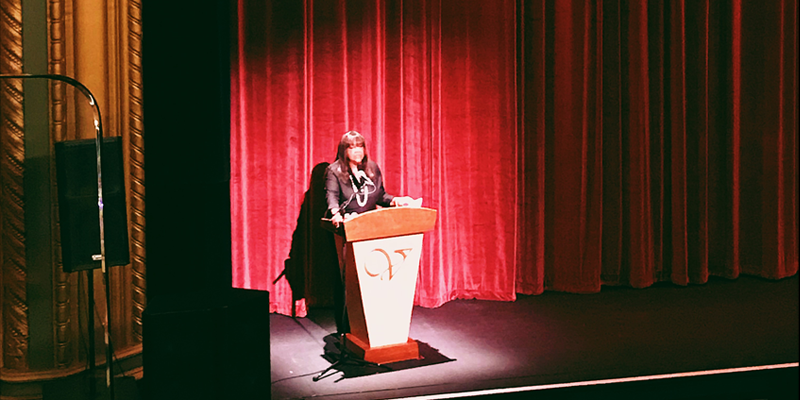With everything arts-related going on this week and weekend, it took more than one person to cover Ebertfest. So I reached out to my fellow Smile Politely editors and together, we bring your our experience of Eberfest 2019.
— Debra Domal, Arts Editor
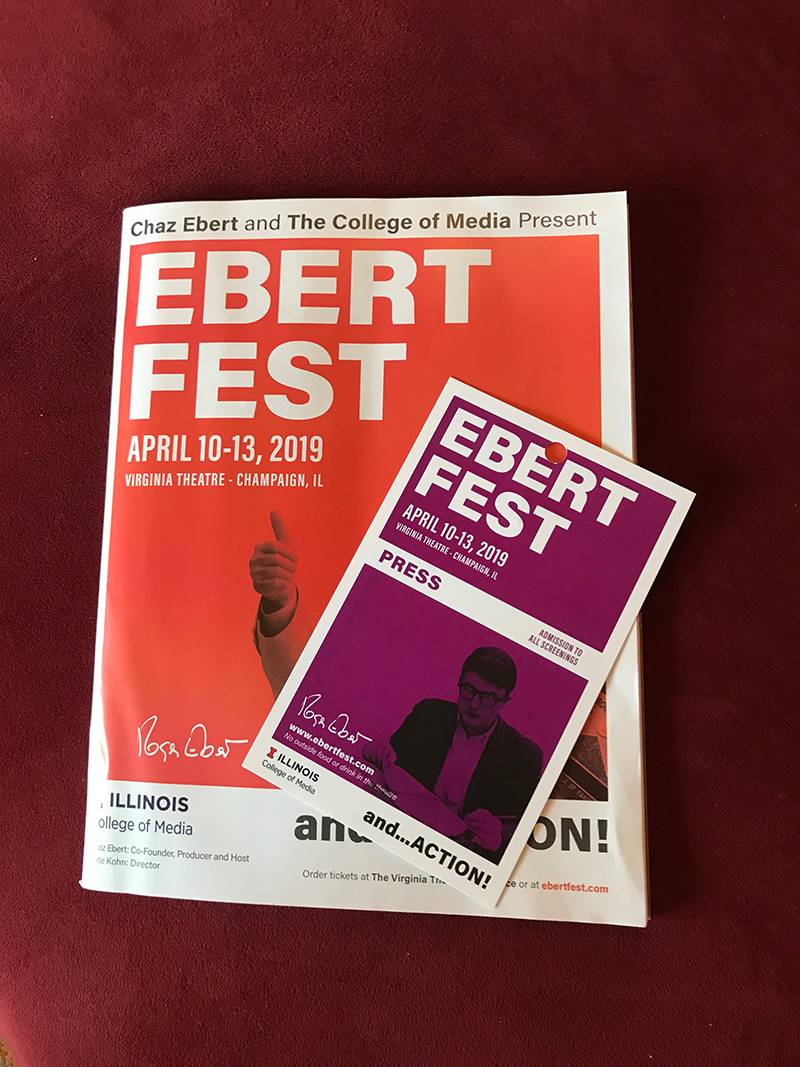
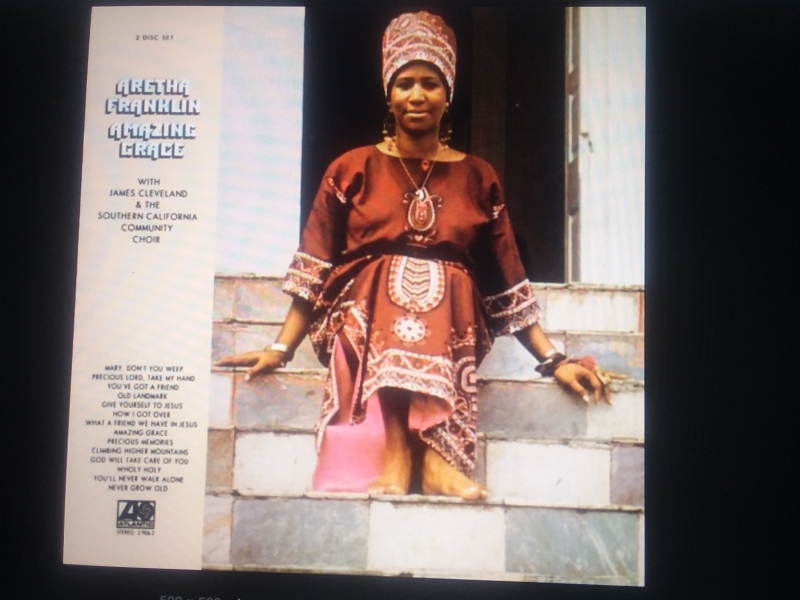
Amazing Grace
I know the “Amazing Grace” album at a cellular level. I knew “the church of Aretha” before I began going to church as a child in the late 1970s.
My father loved Aretha Franklin so much I thought she was a relative. In my 1970s Chicago Southside household, Aretha Franklin was my parent’s source of joy, soul, funk, history, hope, comfort and assurance after rough days. My mother was a teacher on Chicago’s West Side and my father was as a social worker on Chicago’s South Side. Daddy would go down into the basement, sit in his favorite lounge chair, have a drink and wail and moan right along with Aretha while wearing his black headphones with the long slinky cord.
Both of my parents were Great Migration migrants from Mississippi who survived the assassination-riddled 1960s. For them, Aretha was indeed a bridge over troubled American waters. In the community of refugees from Mississippi, Arkansas, Louisiana and Texas who raised me, her name was pronounced “Ah-uh-retha”. She was so precious, even her name required additional breath just to utter it.
So when I heard the first two notes of the opening song “Holy, Holy” at the screening, tears welled up in my eyes as I journeyed back to my childhood.
Unfortunately, those two notes were a long time coming at Ebertfest on Wednesday evening. We arrived at 6:10 p.m., but the festival didn’t open until 7:15 p.m., and the screening itself didn’t begin until 8:11 p.m. After Chaz Ebert’s welcome and the introduction of her team, Ebert decided to have the film producers panel before the film screening, then screen the film and close the night with the MLK Community Choir.
Who DOES that?
I came to Ebertfest to hear Aretha.
I came to Ebertest after meetings, errands, picking up a seven year old and 82 year old, getting them fed, getting my mom, daughter, and self dressed and racing out the door to meet up with my mother-in-law, my husband and four other family members who were meeting us there.
We came to Ebertfest on work nights and school nights to remember Aretha together and support the MLK Community Choir made of local church members that we all know.
So as Chaz addressed her “Ebertfest family” and the importance of empathy, the decision to highlight external guests first and feature the MLK Community Choir last was far from empathetic or community-minded to me.
By the time the film began at 8:11 p.m., much of our excitement had drained out of us as working folk got weary and kids and senior citizens got squirmy.
But Aretha delivered with two peerless performances. Without long, unwieldy previews and platitudes, for most of the film’s 87-minute run, the audience is treated to generous music and worship from Aretha, James Cleveland, the Southern California Choir and the audience. Aretha stood flat-footed and transported believers to the foot of the cross — or at least modeled for young musicians what it means to “leave it all on the altar” or “cutting room floor” — as Aretha sweatily sang her all her heart and soul out.
Unfortunately, as the clock struck 10 p.m., our party of eight scrambled quietly out of the theater just as the MLK Community Choir began to sing. In the spirit of grace and empathy, we hope that future screenings keep such community concerns in mind. (NAC)
Rachel Getting Married
I first experienced this film at home on DVD, so I was looking forward to experiencing it in a more “immersive” setting. Chaz introduced guest Michael Barker (co-founder of Sony Pictures Classics) who went on to introduce the film. He had me until he proudly announced that since he was among “friends and family” he threw out his prepared remarks in favor of speaking from the heart. More than 30 minutes later, the film began. This is not to say that Barker’s ad lib was without value. He shared stories about Roger (who had been the first to encourage his public speaking) and how Roger only became the empathetic Roger we know because of Chaz.
He spoke about our experiencing film together as a way to process our grief over the loss of Roger, and of Rachel Getting Married director Jonathan Demme. He talked about how the type of loss portrayed in this film creates a grief that changes, but never leaves. And for me personally, Barker (and the film) triggered my own grief, being just a few days past a significant death anniversary. My heart broke when Kym (Anne Hathaway) walked into her dead brother’s room and saw it left just as it had been when he was alive. And it broke again when she accidentally reached into the kitchen cabinet and found Ethan’s childhood plate. These two scenes said so much about how we struggle to process grief and memory.
I had come to the theatre somewhat focused on the theme of addiction, in part because of Ebertfest’s panel discussion on that topic. In that discussion, Rachel Getting Married had been rightfully praised for its willingness to show all the parts of addiction and recovery; not just the dramatic ones. To paraphrase, this film successfully portrays addicts and their journeys as non-monolithic.
This film is extremely powerful and layered and deserves multiple viewings. The camera work, the music, the raw performances are all inspired. I’d go as far as to say this is Hathaway’s best performance; it shows her deep capacity for complex characters and dark humor. My Eberfest experience of Rachel Getting Married was more immersive than my home viewing, but it was also largely constructed by the words and thoughts of Ebertfest speakers. This may be why we come to a festival like this. To hear from the industry insiders. But this can be problematic. Barker’s extended intro forced a lens we could not not help but look through. My experience was no longer just my experience. And that can be a good thing or not. (DD)
Bound
Okay, am I the only person who didn’t take a selfie with Jennifer TIlly? I’m still jealous. Tilly and Gershon’s presence at Ebertfest was definitely one of the highlights. They have amazing chemistry, tell great stories, vamp off each other, and make us fall in love with them (and Corky and Violet) all over again. Ebert championed this film early on and his TV review served as a fitting intro. There is a strange exchange of energy when you watch a film with its stars right there in the audience. You laugh louder and hoot harder knowing they are there. It is an exchange of love and gratitude between both parties. It is thrilling, but it is only one part of the experience.
This film was and is brave in its telling of Corky and Violet’s love story and its depiction of them as smart, strong, ass-kicking menaces of the mob. Both Tilly and Gershon shared that they had been warned by agents that this film would be career suicide. We’re so glad they didn’t care. This was festival fare at its best. Hearing about how the Wachowskis negotiated their small budget with Dino De Laurentis. Learning that Gershon’s Corky was partially inspired by Robert Mitchum. Learning that Tilly’s Violet was largely inspired by Warhol star Ultra Violet. Hearing Gershon, who is now part of the cast of Riverdale, say that none of its actors playing queer characters had ever seen Bound. How easy it is for them. How their agents push them towards these roles which only up their hotness quotient and their number of IG followers. What a difference 23 years make, or do they? (DD)
Maya Angelou: And Still I Rise
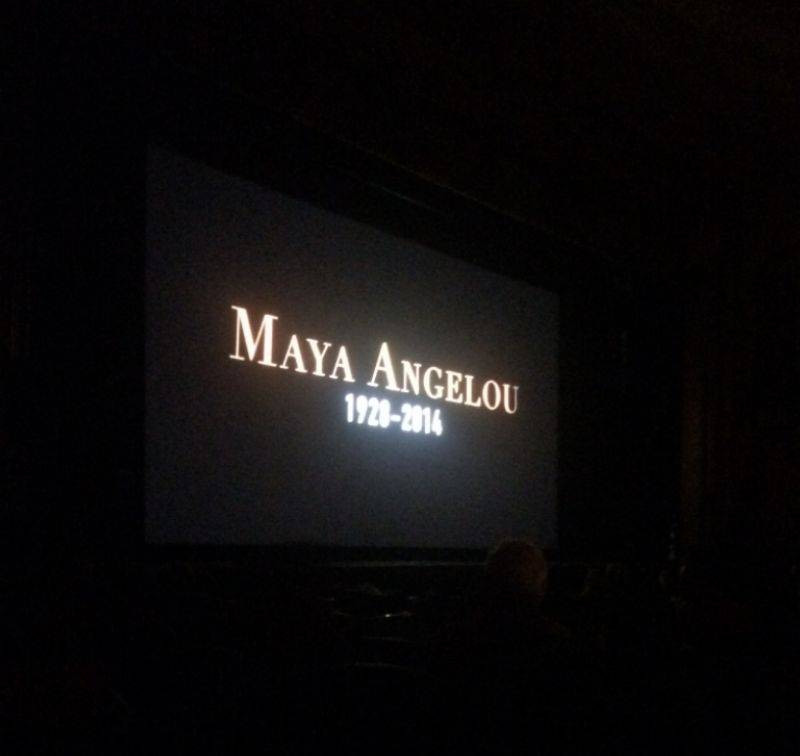
This was a beautiful and powerful film. I expected no less, but seeing and hearing Maya Angelou, already larger than life, on the big screen left nothing to be desired. The film did an admirable job of finding a narrative thread through Angelou’s life, picking out key events from the veritable bevy of accomplishments and experiences she had to highlight her drive, her compassion, her anger, her wit, and her humanness.
Post-film, the announcement was made that there was a new award this year at Ebertfest, the Icon Award, and that this documentary had been chosent to recieve it. Following a gracious acceptance, Rita Coburn, co-director of the film sat with a panel and took questions about the filmmaking process, both from panel members and from the audience. My favorite piece of trivia she shared? In a reenactment scene depicting the Ku Klux Klan riding into Angelou’s childhood hometown, Coburn (rightfully) did not want to pay money to white men to impersonate KKK members. As such, all of the reenactment riders (save for one white woman) were black men. There is a larger discussion about the state of racism in America throughout Angelou’s lifetime, and continuing presently, that this film encourages, and with limited space and perspective (due to my own demographic identity), I’m in no position to expound further on that. I can only say that I highly recommend this film — in her life Maya Angelou was many things: artist, activist, teacher — and through this documentary, she teaches still. (NL)
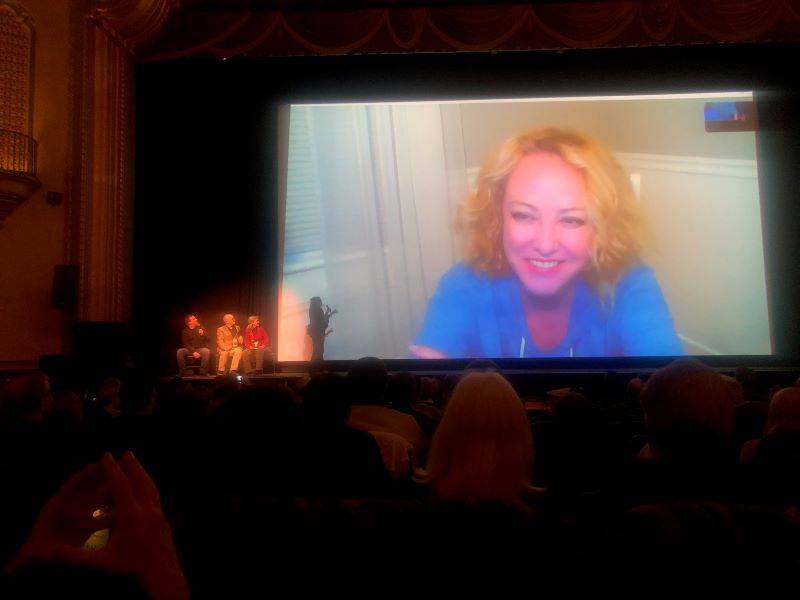
Sideways
My husband and I attended the final film of the festival, Sideways. This has always been a favorite of ours — we revive the iconic “I’m not drinking any fucking Merlot” quote on a fairly regular basis, and we’d never actually seen it on the big screen, so we were willing to brave the 9 p.m. start time (we are for sure past the threshold of 9 p.m. movie start times). There were a couple of immediate disappointments initially, as we learned scheduled guest Virginia Madsen was detained by a current project and would not be appearing on the post-film panel, and there was no wine. I don’t have inner knowledge of the alcohol serving decisions at the Virginia or for Ebertfest in general, but it would’ve been a super smart move to have some Pinot, or even some “fucking Merlot” available for enjoying while taking in a movie centered around wine. Despite this absence, it was totally entertaining to watch this film in the presence of others, laughing along at the absurdity of Jack’s (Thomas Haden Church) hyper-sexual antics and Miles’ (Paul Giamatti) hilariously pathetic existence.
Though Madsen was not present for the panel, she generously agreed to FaceTime from Wilmington, North Carolina where she was in the midst of filming a Swamp Thing series. After some technical difficulties, Madsen shared her gratitude for Chaz and the continuation of Ebertfest, getting visibly emotional as she recalled her relationship with Roger. A Chicago native, Madsen first met Ebert in the 80’s when he interviewed her mother Elaine, a writer/producer/director. It was great to hear her perspective on pivotal scenes from the movie, including the picnic in the sunset (with Giamatti, Church, and Sandra Oh) which she offered up as the definitive moment of what it was like to film the movie, and her monologue on wine during the first emotionally intimate encounter with Giamatti.
I felt a bit let down by the film discussion, that was undoubtedly hampered by the timing — it was after midnight in Madsen’s time zone — and perhaps the fact because it was the end of the festival. There just wasn’t much time or energy devoted to digging into the themes of the movie. But overall, a solid pick for the festival and an enjoyable communal movie-going experience. (JM)
Final thoughts
Maybe it was the just the screenings I went to, but the festival seems to be swaying towards an older demographic. And this is a problem. If Eberfest is going to continue to be relevant it needs to capture the attention of Chambana’s younger audiences. Maybe younger audiences simply prefer to curate their entertainment themselves and consume them on demand and on devices. Maybe Ebertfest’s separateness from the local filmmaking community leaves us re-examining the past (which is not an entirely bad thing) without experiencing the adrenaline rush of experimental steps into future — VR empathy exhibits notwithstanding. (DD)
This article was written by Nicole Anderson Cobb, Debra Domal, Nicole Lanphier, and Julie McClure.
Top photo and second photo from Debra Domal, third photo from Nicole Anderson Cobb, fourth photo from Nicole Lanphier, last photo from Julie McClure.








